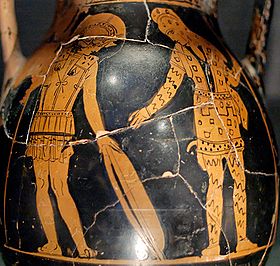Across the academy, conferences are famous for being hierarchical, expensive, humiliating, of questionable worth, and a general venue for all sorts of debauchery. (There are papers too.) This week, the world of Classics descends upon Washington D.C> Fortunately, Amy Pistone has generated some good advice for people attending conferences.
But professional conferences often require social engagement! Talking to new people can be hard. If you find yourself at a loss for words this conference season, why not try something new by using an old script?
Diomedes: Il. 6.123-129
“Bestie, who are you of mortal humans?
For I have never seen you before in this ennobling battle.
But now you stride out far ahead of everyone
In your daring—where you await my ash-wood spear.
Those who oppose my might are children of miserable parents!
But, if you are one of the immortals come down from the sky,
I don’t wish to fight with the sky-dwelling gods!”
τίς δὲ σύ ἐσσι φέριστε καταθνητῶν ἀνθρώπων;
οὐ μὲν γάρ ποτ’ ὄπωπα μάχῃ ἔνι κυδιανείρῃ
τὸ πρίν· ἀτὰρ μὲν νῦν γε πολὺ προβέβηκας ἁπάντων
σῷ θάρσει, ὅ τ’ ἐμὸν δολιχόσκιον ἔγχος ἔμεινας·
δυστήνων δέ τε παῖδες ἐμῷ μένει ἀντιόωσιν.
εἰ δέ τις ἀθανάτων γε κατ’ οὐρανοῦ εἰλήλουθας,
οὐκ ἂν ἔγωγε θεοῖσιν ἐπουρανίοισι μαχοίμην.
Glaukos, 6.145-151
“Oh, you great-hearted son of Tydeus, why are you asking about pedigree?
The generations of men are just like leaves on a tree:
The wind blows some to the ground and then the forest
Grows lush with others when spring comes again.
In this way, the race of men grows and then dies in turn.
But if you are willing, learn about these things so you may know
My lineage well—many are the men who know me.”
Τυδεΐδη μεγάθυμε τί ἢ γενεὴν ἐρεείνεις;
οἵη περ φύλλων γενεὴ τοίη δὲ καὶ ἀνδρῶν.
φύλλα τὰ μέν τ’ ἄνεμος χαμάδις χέει, ἄλλα δέ θ’ ὕλη
τηλεθόωσα φύει, ἔαρος δ’ ἐπιγίγνεται ὥρη·
ὣς ἀνδρῶν γενεὴ ἣ μὲν φύει ἣ δ’ ἀπολήγει.
εἰ δ’ ἐθέλεις καὶ ταῦτα δαήμεναι ὄφρ’ ἐὺ εἰδῇς
ἡμετέρην γενεήν, πολλοὶ δέ μιν ἄνδρες ἴσασιν
Then switch nametags!

This post was inspired by the ever dynamic Rogue Classicist:
The conference equivalent of exchanging armor would probably be switching handouts with someone else and then giving a talk based on their handout. Aha! a new career goal!
If you are serious about getting to know new people (and there are always a lot of nice, interesting people at the annual meeting), Zeno has some great advice:
“We have two ears but one mouth so that we may listen more and talk less”
δύο ὦτα ἔχομεν, στόμα δὲ ἕν, ἵνα πλείω μὲν ἀκούωμεν, ἥττονα δὲ λέγωμεν
Like this:
Like Loading...





